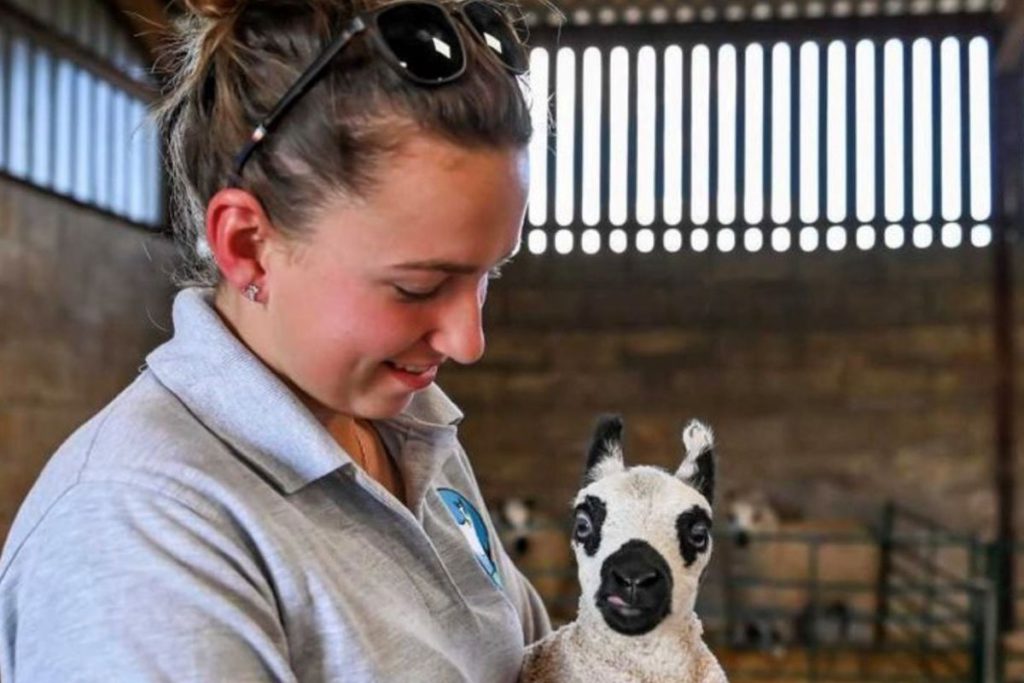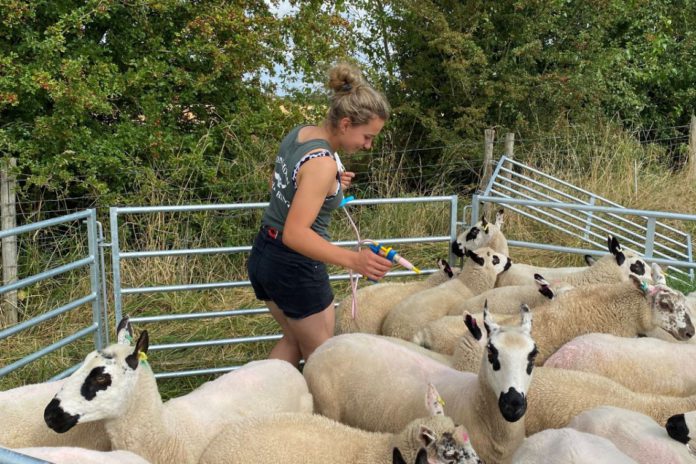That’s Farming editor, Catherina Cunnane, in conversation with Sophie Corderoy (19) in this week’s women in ag segment. She is a first-generation farmer who does not hail from an agricultural background.
“My name is Sophie Corderoy, from Didcot in Oxfordshire. I do not come from a farming background; none of my family members are involved in agriculture.
My interest in farming began during a work experience placement when I was 13 on a sheep farm during my Easter holidays.
Initially, I wanted to be a vet, so I completed various work experience placements to gain as much experience with various animals during all of my school holidays.
After my first placement lambing, I wanted to do it again the following year, so I contacted the farmer and asked if he had any work.
Unfortunately, he did not, so he put me in contact with another local sheep farmer, where I completed two weeks of lambing during my holidays.
After the end of these two weeks, this farmer offered me a job for the weekends and during my school holidays. I managed to get a job at this sheep farm after just two weeks of work experience.
Once I got into the agricultural industry, I have found it easy to progress further. My mum’s partner, Tim Gibbons, secured my first lambing placement, starting my passion for the industry.
Without Tim’s contacts or help, I would never have gone into agriculture, and I would not be doing what I am today.
First-generation sheep farmer
I am in Didcot. However, most of my sheep graze the fields around North and South Moreton. I run the sheep on my own in terms of management and all admin work.
My partner, Robert Pierpoint, helps me with most practical aspects, such as fencing and moving sheep, when not working.
I currently rent 54-acres of permanent grassland from a range of farmers around my area.
I do not own any of this land. I complete all aspects of grassland management, such as fertilising, topping and spraying any invasive weeds on all the grass I rent.
Dairy farm
I work full-time on a dairy farm in Didcot. I have been on this farm for three years. After two weeks of work experience at college, I secured a part-time job, which became full-time once I finished my college course.
In 2018, I enrolled at BCA (Berkshire College of Agriculture) in Maidenhead. I completed a level three extended diploma in agriculture, achieving a distinction star. I finished this course in July 2020.
They have a total of 600 animals and around 360 milking cows. I enjoy working on the dairy farm, and I am always keen to learn and develop new skills.

Corderoy’s Kerrys
Also, I work on a sheep farm on the weekends and during the lambing season, and I have my own flock that I manage and look after.
A year after working on the sheep farm, I knew I wanted to have my own flock to manage.
I purchased my first lot of ewes and lambs in May 2020. If someone told me I would be a farmer when I was younger, I probably would have said something like: ‘You must be mad, I will never be able to do anything like that’.
My flock name is Corderoy’s Flock of Kerry Hill Sheep. I am also known as Corderoy’s Kerrys. I have Kerry Hill, Badger Face sheep and a variety of Suffolk-crosses.
I currently have 71 sheep, 36 of which are ewes. To increase the number of ewes in my flock, I will hold back 6-10 replacement ewe lambs every year. My desire is to keep a closed flock instead of buying replacement ewe lambs every year.
I lamb at the beginning of May indoors. I lamb my sheep in May as I complete a lambing season for another sheep farmer during March and April, and I do not want to lamb my sheep at the same time.
I would rather lamb later on to focus on my own flock.
The grass is also better quality when the ewes and lambs go out to grass after lambing.
I produce grass reared lamb boxes that I sell locally. I will sell my best pedigree Kerry Hill sheep to other breeders.

Women in agriculture
I feel that I am treated the same as my male colleagues. I have been given the same opportunities as any other person I work with.
However, I still do not think women are given the recognition they deserve. We are getting a lot more recognition than we used to, but it still needs improvement.
Women are still underestimated in this sector; we are capable of a lot more than most people think.
To encourage more women into agriculture, women need to share their stories and show other women that it is possible to get into the industry and it is no longer a male-dominated sector.
Women need to consider a career in agriculture. It is a very rewarding job, and women bring a different perspective to farming.
I feel incredibly proud to be a young woman in the farming industry, especially as I have my own flock of sheep on top of working full-time.
Also, I have been able to achieve all this despite not coming from a farming background.
Nothing has just been handed to me; I have had to work very hard for everything I have.
Life as a woman in agriculture can be challenging as I am not always taken seriously.
Every now and again, I receive comments such as ‘are they actually your sheep?’ or ‘I cannot believe you are a farmer?’.
I have been lucky with the people I work with. They are all supportive of my flock and are always willing to help. However, I know not all women are as fortunate as I have been.

Future
In the future, I would like to further my studies in ovine genetics and business management to ensure that I run my business to the best of my ability.
As a young person starting in the industry, I would advise young people that have no experience at all to go to an agricultural college to learn the basics of the industry and to gain a range of knowledge of arable and livestock farming.
I would also say that It is important to gain as much work experience as possible to show farmers you are willing to work hard and learn about the industry.
It is important to get your name out there and build up a list of contacts through the farming community.
Goal
My ultimate goal for my sheep would be to have 500 pedigree Kerry Hill breeding ewes.
Also, I would like to show my sheep around the country. Hopefully, one day I will win some classes at some of the biggest agricultural shows, such as the Royal Welsh Show.
Life as a young farmer can be challenging, especially for someone with no industry background.
I do not have an endless list of farming contacts to contact when I need to find some more grazing or need help with the sheep. It is a tough but rewarding job to do.

Future of agriculture
I think agriculture will struggle as an industry due to the current climate.
Agriculture, especially livestock farmers, has become a target by social media for things such as climate change.
Our sector is constantly being shown in a bad light rather than being shown for the rewarding hardworking industry that it is.
The only way to change this view of farming is to educate the younger generations in schools and get children more involved in where their food comes from.
If the general public’s view of this industry does not change soon, UK agriculture will become an industry where no one wants to work.
Therefore, a large number of farms will no longer be able to operate,” the first-generation sheep farmer concluded.
Read more women in ag profiles.
To share your story like this first-generation sheep farmer, email – [email protected]





